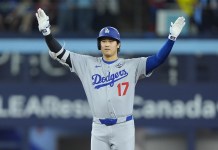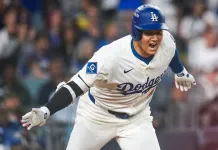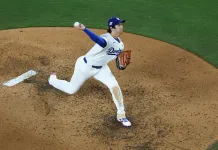We go from best-of-three to best-of-five as the American League Division Series round gets going on Tuesday. Mariners vs. Astros will be the early game with a 3:37 p.m. ET start time and Guardians vs. Yankees will be in primetime with a 7:37 p.m. ET first pitch.
Seattle was one of three underdogs (all road teams) to advance from the newly-formed Wild Card Round and draw a familiar foe with a Houston team that had the best record in the AL. Cleveland was the lone home team to advance and gets a New York squad that started on an historic pace and then tailed off before finishing on a high note. Both Wild Card winners are sizable underdogs in their respective series.
No. 5 Seattle Mariners (%plussign% 185) vs. No. 1 Houston Astros (-220)
The Mariners and Astros met 19 times during the final year of the imbalanced regular season schedule and Houston led the season series 12-7. Next year, teams will only play division rivals 12 times and will play every team in the league. That should be a positive development for the Mariners, who have not had a winning record against the Astros since going 10-9 in 2018.
One of the big benefits to being a top-two seed is the bye to the Division Series, which allows the Astros to send out a fully-rested Justin Verlander. The Mariners were fortunate to end their series against the Blue Jays in two games, so they’ll be able to send Logan Gilbert to the hill instead of possibly running out a Chris Flexen or Marco Gonzales. They’ll also now be able to send Luis Castillo back out on regular rest for Game 2.
Still, the Mariners are at a clear disadvantage for Game 1 against the presumptive AL Cy Young Award winner in Verlander, who finished the season with a 1.75 ERA and a 2.49 FIP. It won’t get much easier in Game 2 against Framber Valdez, who was 10th in fWAR with 4.4 and had a 2.82 ERA with a 3.06 FIP. The minimum for a “quality start” is three or fewer earned runs allowed over six or more innings. From April 25-September 18, every start for Valdez met that criteria. He had a 2.41 ERA over those 25 starts, including two against Seattle, but he did allow three earned runs in both.
Offensively, Houston had a 112 wRC %plussign%, which means that the Astros were 12% above league average. Seattle had a 107 wRC %plussign% and that metric is park-adjusted, but both of these are pretty good pitcher’s parks, at least when the roof is closed in Houston. The Astros struck out at the second-lowest rate in baseball and 3.3% less often than the Mariners, but Seattle did have the second-highest walk rate, while the Astros were eighth.
Houston’s pitchers were 13th in BB%, but second in K%, trailing only the Mets. That will be a huge key to this series. If the Astros carry a high strikeout rate and a low walk rate as a staff, they should be in great shape to advance. What is also unfortunate for Seattle is that the big bullpen advantage for the series against Toronto is gone, as the Astros were third in bullpen fWAR, first in K%, first in reliever ERA and first in reliever FIP.
In a small sample size, variance is certainly possible, but the Mariners are heavy underdogs in Game 1 and a loss to Verlander would mean having to win three out of the next four. The Astros were second in wRC %plussign% against lefties, so I’d have very low hopes for Robbie Ray if he were to get another postseason start. Personally, I’d use George Kirby as my Game 3 starter after Castillo in Game 2. We’ll see if Scott Servais does that. If he does, I’d have higher hopes for the Mariners.
I won’t have a series bet here. As far as what I’m looking for in this series, Houston only allowed 3.2 runs per game and just 3.12 runs per game at home. The head-to-head meetings between these teams averaged 7.26 runs per game, but keep in mind that some of those games were started by guys like Gonzales, Flexen and the like. What’s really scary, and possibly the determining factor, in a series like this is that the Astros can pick from any of their four other starters beyond Valdez and then put guys like Jose Urquidy, Cristian Javier, Luis Garcia or Lance McCullers Jr. in the bullpen and get multiple innings from them.
Urquidy had the highest ERA of any pitcher with at least seven innings pitched at 3.94. Houston’s run-prevention skills are elite and should be the reason that they advance.
I’ll be looking for a Game 2 under with Castillo and Valdez. Otherwise, I’m honestly not sure I’ll have a ton of betting interest in this series. If the Mariners are intent on skipping Ray for Kirby and lose Game 1, I could potentially talk myself into taking them for the series at %plussign% 350 or higher, just as a dice roll on a scrappy team with a solid bullpen.
No. 3 Cleveland Guardians (%plussign% 175) vs. No. 2 New York Yankees (-210)
The Guardians only scored three runs in two games, but those two home runs were enough to propel Cleveland to the ALDS. Cleveland’s pitching in the series against the Rays was simply absurd. Shane Bieber, Tristan McKenzie and a cast of relievers allowed one run on nine hits over 24 innings with 29 strikeouts against just six walks. It was one of the most dominant pitching performances we’ve ever seen in the postseason.
However, it was also one of the worst offensive performances we’ve seen in the postseason from Cleveland’s hitters. The Rays allowed three runs on 13 hits over 22 innings with 26 strikeouts against three walks. Now the Guardians draw a Yankees pitching staff that was third in ERA, sixth in FIP and seventh in fWAR.
This series ultimately comes down to the supporting casts on offense. Will the Guardians pitch around Aaron Judge as much as they can and will the Yankees pitch around Jose Ramirez when the opportunity presents itself. Look at how much of the offense Judge and Ramirez accounted for with their respective teams:





